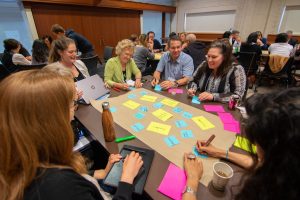
Galvanizing the Canadian Social Labs Field
In June 2018, RADIUS hosted CONVERGE, a gathering of over 130 active social innovation lab practitioners and key ecosystem enablers in Vancouver, BC. The Canadian labs field has grown substantially

RADIUS’ unique approach to social innovation lab practice combines our signature entrepreneurial education and incubation expertise with the collaborative infrastructure to identify systemic barriers and catalyze new solutions.
Working at multiple levels, we connect the energy and insights generated by entrepreneurial actors creating on the ground solutions with the key people, organizations and systems influencers engaged in the challenge.
This approach bridges the best of innovation labs and incubation programs – some might call it a “lab-cubator” (read more about this definition below). Our overarching commitment is to harnessing entrepreneurial energy and learning in service of systemic change.
We strive for each RADIUS participant to have a transformative leadership experience.
Each venture should be supported to reach its financial and impact goals.
We learn through doing and mobilize insights to catalyze new innovation and help the whole system to learn and evolve.
Events, processes or platforms for:
Programs that:
Combining the best of both models:
Our multi-year innovation programs move through the following, iterative phases:
Phase 0 – Pre-work: Qualifying the problem space & identifying purpose, partners, resources;
Phase 1 – Opportunity scoping: A deep dive into the problem space, mapping the current system and existing solutions and leverage points;
Phase 2 – Incubate and learn (and repeat!): The heart of the model, working with those actively building entrepreneurial responses to the issue while generating insights around barriers and opportunities for broader systems change;
Phase 3 – Mobilize learning: Based on insights generated in Phase 2, Phase 3 works to simultaneously:
To learn more about social innovation labs, check out these resources:
University of Waterloo Social Innovation Lab Guide
McConnell Foundation blog by Darcy Riddell
Stanford Social Innovation Review article about Zaid Hassan’s
SiG blog by Kiri Bird

In June 2018, RADIUS hosted CONVERGE, a gathering of over 130 active social innovation lab practitioners and key ecosystem enablers in Vancouver, BC. The Canadian labs field has grown substantially
If you have questions about the RADIUS Lab Methodology, contact Associate Director of Labs Véronik Campbell at vcampbell@radiussfu.com.